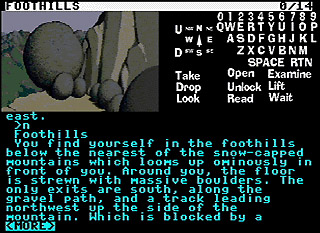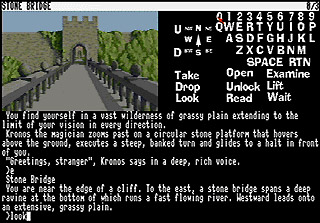DC News is a News and downloads site for the
Sega Dreamcast, We have all the latest emulators, homebrew,
commercial games for the Dreamcast and all the downloads on this site,
we also cover commercial gaming and console news. Part of the
DCEmu Homebrew & Gaming Network.
Interpreters for Dreamcast Section Name
Magnetic DC Author Eytan
Kaziberdov Description A port of the Magnetic Scrolls adventures
interpreter Screenshots 

Download Binary
v1.2 Unscrambled bin Here Binary- Here
v1.1(new) Here Discjuggler Version- Here
v1.1(new) Here Information Supports
Keyboard and Joystick
Background Music
Change Game without Restart
Animation
on "Collection" Games
40/80 Column Text
Text Color preference
More Info Magnetic: An interpreter for Magnetic Scrolls
adventures
Written by Niclas Karlsson
Version 2.2
Magnetic
is an interpreter for the games written between 1985 and
1991 by Magnetic
Scrolls, a text adventure producer based in London,
England. Although they
only produced seven games they have acquired
legendary status for text adventures
of as good quality as Infocom
accompanied by exceptional graphics.
Magnetic is released under the terms of the GNU General Public
License. See
the file COPYING that is included with this program for
details. - WHAT
YOU NEED FOR PLAYING ----------------------------------------------- It
is illegal to play Magnetic Scrolls games if you do not own the
original packages.
Their games, sadly enough, have been unavailable
for years, and your only
choice may be downloading them from the
Internet. Having said this, you should
get hold of the following: (1) the story files;
(2) the graphics files
(optional);
(3) the title pictures (optional);
(4) the hint files (optional);
(5) documentation from the original packages;
(6) the Magnetic interpreter.
The best source for this material is Stefan Meier's Magnetic Scrolls
Memorial
web page, which is part of the IF Legends site at http://www.if-legends.org/ -
THE STORY FILES ---------------------------------------------------------
The Magnetic Scrolls games as originally distributed were in a
somewhat complex
data format, different for most platforms. The
interpreter uses its own story
file format, to be identified by the
file name extension ".mag".
You can download all story files from
the Magnetic Scrolls Memorial site (see
above). Magnetic has been successfully tested with story files created
from
Amstrad CPC, Acorn Archimedes, Commodore 64, MS-DOS, Spectrum and
Spectrum +3 versions of the games. An alternative way to obtain the
story
files is to extract them from the original game files. Currently the Amiga,
Atari ST, Apple Macintosh and Sinclair QL
releases of the games are not supported.
This is because the games
were originally written in native machine code for
Motorola 68000
based systems (which all the above computers are). When porting
to
other systems Magnetic Scrolls implemented a limited subset of 68000
machine code as an emulator on the target system; it is this limited
subset
which the Magnetic interpreter implements. Magnetic Scrolls also released
versions for at least the Apple II
and Atari XL. Currently, we have not developed
any tools to extract
the data from such versions, nor have we located all
the versions for
these machines. If you have an emulator image or an original
version
for one of these machines, please contact the Magnetic development
team. - EXTRACTING STORY FILES FROM C64 VERSIONS --------------------------------
The Commodore 64 versions of the Magnetic Scrolls games can be
extracted from
C64 disk images (i.e. files representing the contents
of the games released
for the Commodore 64). These files are
identified by having a file name ending
with ".d64". Disk images for
"The Pawn", "The Guild
of Thieves", "Corruption", "Jinxter" and
"Fish"
can be found on the Internet on numerous C64 web sites. To convert these
files to the interpreter's own format, the Xtract64
program must be used.
Run the program without any arguments to read
a help screen describing its
syntax. You'll find that Xtract64 is
easy to use; for example, for "The
Pawn", the command line might be Xtract64 pawn-1.d64 pawn-2.d64 pawn.mag -
EXTRACTING STORY FILES FROM MS-DOS VERSIONS -----------------------------
Story files can be created by extracting the data from both the
original MS-DOS
releases and the later "Magnetic Windows" releases
of "Wonderland"
and "The Magnetic Scrolls Collection, Volume 1". The
latter of these
comprised new versions of "The Guild of Thieves",
"Corruption"
and "Fish!". To convert these files to the interpreter's own
format the XtractPC
(for the original releases) or XtractMW (for the "Magnetic
Windows"
releases) programs, which are included with this interpreter,
must
be used. Run XtractPC or XtractMW without any arguments to read a
help screen. The syntax for XtractPC is: XtractPC game game.mag
where "game" is the full path to the data files, minus any trailing
numbers. For example, the data files for "The Pawn" are called
"pawn1"
to "pawn6". If these files are in a directory
"c:\Games\Magnetic\Pawn",
the command line might be: XtractPC c:\Games\Magnetic\Pawn\pawn Pawn.mag
The syntax for XtractMW is: XtractMW game.rdf game.mag where "game.rdf"
is the full path to the game's main rdf file
("all.rdf" for "Wonderland";
"corr.rdf", "fish.rdf" and "guild.rdf"
for the
games in "Collection Volume 1"). For example, for
"Wonderland",
the command line might be: XtractMW c:\Games\Magnetic\Wonder\all.rdf Wonder.mag -
THE GRAPHICS FILES ------------------------------------------------------
The Magnetic Scrolls adventures were as well known for the quality
of their
graphics as of their text. The Magnetic interpreter supports
graphics files
(".gfx") which can be created from the Amiga releases.
You'll probably
want to download the graphics files from the Magnetic
Scrolls Memorial site.
The format of Magnetic's graphics files differs between the original
and Magnetic
Windows ("Wonderland" and "Collection Volume 1")
releases,
therefore a story file created from an original release
cannot be used with
a graphics file from a Magnetic Windows release,
and vice versa. Included
with the interpreter is GfxLink, a tool to build graphics
files from the original
Amiga releases of the Magnetic Scrolls
games. To use GfxLink, supply as arguments
the directory containing
the Amiga files and the output graphics file name,
e.g. GfxLink C:\UAE\Games\ThePawn Pawn.gfx The graphics files needed
for "Wonderland" and the games in
"Collection Volume 1"
are somewhat different from those produced by
GfxLink; instead GfxLink2 must
be used. Firstly, you need an Amiga
hard-drive installation of the game, and
during installation must
have selected the option to expand the compacted
graphics files. If
you choose this option, two extra files ("user.rsc"
and "user.rdf")
are created by the installer. Then to use GfxLink2,
supply as an
argument the full path to the "user.rsc" file, e.g.
GfxLink2 C:\UAE\Games\Wonder\user.rsc If GfxLink2 detects "Wonderland",
the file "wonder.gfx" will be
created; if "Collection Volume
1" is detected, the files
"corrupt.gfx", "fish.gfx"
and "guild.gfx" will be created. - THE HINT FILES ----------------------------------------------------------
The Magnetic Windows releases of the Magnetic Scrolls adventures
("Wonderland"
and "Collection Volume 1") come with online hints,
which can be
accessed by entering "hint", "hints" or "help" at
the
input prompt. The Magnetic interpreter supports these hints by
looking
for a file with the same name as the story file, but with the
extension ".hnt".
The hint files can be obtained from Stefan Meier's
Magnetic Scrolls Memorial
site. - THE TITLE SCREENS -------------------------------------------------------
The Amiga versions of some of the games (as well as the MS-DOS and
Archimedes
versions of "Wonderland") featured colourful title
screens. Magnetic
supports these title pictures, the files for which
can be obtained from the
Magnetic Scrolls Memorial web page. The
title files should have the same name
as the game file, except that
the title picture files must end in ".png".
MS-DOS Magnetic requires the support program "title.exe" to be
present
in the same directory as "magnetic.exe" in order to display
the
title pictures. "title.exe" is included with the interpreter. -
DOCUMENTATION FROM THE ORIGINAL PACKAGES --------------------------------
To prevent software pirates from spreading their programs, Magnetic
Scrolls
added a password protection to most of their games. Although
the extraction
programs (Xtract64, etc.) offer you the chance to
remove this type of protection
while extracting the story file, most
games still cannot be won without the
original documentation which
often contained vital clues. Stefan Meier's Magnetic
Scrolls Memorial
web page offers a growing amount of scanned material from
the original
packages. Further material is also available from the Magnetic
Scrolls
Gallery by Rochus Boerner (now maintained by David Sinclair)
http://www.webpan.com/dsinclair/ms/mscrolls.html - THE MAGNETIC INTERPRETER
(DOS VERSION) ---------------------------------- As you are reading this
text file you have the Magnetic interpreter
already. Its most recent release
can always be found at http://www.ifarchive.org/ which is a vast
archive dedicated to text adventures ("interactive
fiction").
Installation is easy. Beside the executable there are only a few
font files
that can either be stored in the current directory or in
the same directory
as the executable. Run the program without any
arguments to view its help
screen. As an example, to play "Fish!"
you would have to type
magnetic fish The interpreter would display the title screen "fish.png",
open the
story file "fish.mag", the graphics file "fish.gfx",
the hint file
"fish.hnt" (if the game supports hints) and, if successful,
run the
game. If Magnetic is being run in MS-DOS under Windows 95, 98 or ME,
long file names can be used. The graphics and hint files can
optionally be
specified as second and third arguments on the command
line. Magnetic
supports command line editing and history to make typing
more convenient.
All the common editing keys work as you would
expect. Other features can be
activated via hot keys, which are: Alt-C show copyright and license info
Alt-H help
Alt-P playback on
Alt-R recording on/off
Alt-S seed random
numbers
Alt-T transcription on/off
Alt-U undo last turn
Alt-X exit
game
F1 change the picture size Finally, if the interpreter ever "hangs",
try ctrl-break to exit. When a Magnetic Windows game is started, graphics
are not initially
visible. To turn the graphics on, enter the command "graphics
on" at
the input prompt. - CREDITS -----------------------------------------------------------------
Niclas Karlsson <nkarlsso@abo.fi>
Development of the Magnetic interpreter.
David Kinder <d.kinder@btinternet.com>
Magnetic 2.x development, Windows,
MS-DOS (32-bit) and Amiga ports. Stefan Meier <stefan.meier@if-legends.org>
Magnetic 2.x development, JMagnetic Java port and the
Magnetic Scrolls Memorial
web site. Paul David Doherty <pdd@if-legends.org>
Magnetic 2.x
development, story file extraction, help and testing. Stefan Jokisch
MS-DOS (16-bit) port. Torbjörn Andersson <d91tan@update.uu.se>
Unix/Gtk port. Simon Baldwin <simonb@sco.com>
Glk port.
Rochus Boerner
Title screen pictures. For comments and bug reports,
our thanks go to Toine de Greef,
Jacob Gunness, Kai Hesse and Miron Schmidt.
MS-DOS Magnetic uses libpng (by Guy Eric Schalnat, Andreas Dilger,
Glenn Randers-Pehrson
and others) and zlib (by Jean-loup Gailly and
Mark Adler) to decode the title
pictures.
The Hottest DCEmu Posters
|  Sega Everdrive Flashcart
Sega Everdrive Flashcart






